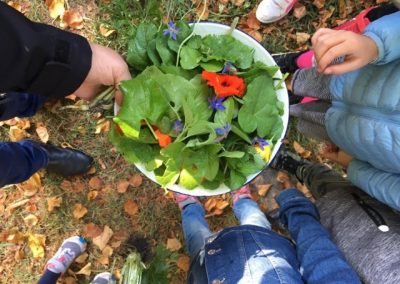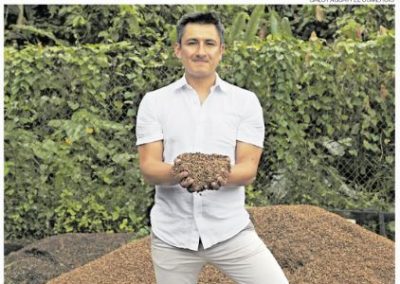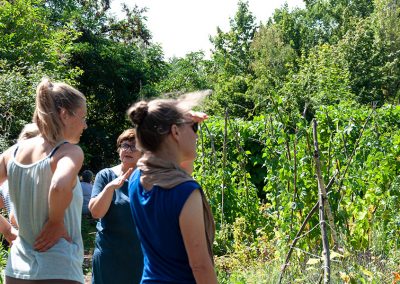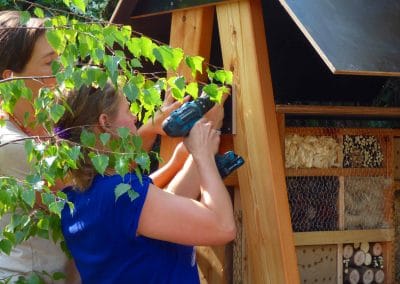Andes Bioenergy use thermochemical conversion processes to transform agro-residues generated and accumulated in agro-industrial facilities, into carbon-related products (e.g. biochar, low cost filters, inks, animal diet additives, biofuels, or thermal energy) within a multifunctional approach. With a design and cost adapted to middle-income countries, BDA´s multifunctional facilities promote the bioeconomy, citizen science, gender equality, carbon sequestration, replacement of fossil fuels with renewable energy and the creation of technology jobs in the rural sector.
There are significant common grounds between the thermochemical conversion of agro-residues into biochar promoted by Andes Bioenergy and the principles of Edible Cities, namely: the concept of multifunctionality, the citizen science or the participative action research. It is worth to highlight that the unique properties of biochar (e.g. low density; extremely light) can be of major relevance to promote the development and implementation of edible city solutions into urban infrastructures without increasing its weight. For instance, vertical edible/gardens and rooftop/edible gardens. Furthermore, the carbonaceous materials as the biochar are of importance in promoting the adaptation to climate changes in cities through solutions as rain gardens or greenery solutions in roads and avenues. Likewise, the use of certain urban wastes (as tree pruning wastes) as feedstock to produce biochar, can be of relevance for the treatment of contaminated soils in the urban sector or to support residential farming activities. The intersection between the technologies for the thermal refining of agro-residues / forest residues/ pruning waste, climate changes, the participative action research (i.e. transformative research), start-up development and applied research & innovation in the rural sector of middle-income countries.
They have also been involved in the International Sustainable Chemistry Collaborative Centre – ISC3 and the Green Talents network of the Federal Ministry of Education and Research – BMBF.
Some of their achievements are the 2018 Green Talent Award (BMBF) & 1st implemented reactor; 2019 Entrepreneurial spirit award (ISC3) & Implementation of four (+) reactors and the 2020 Implementation of a 1000 t/y capacity facility to produce biochar and bio-oils within the Palm Oil Sector of Ecuador.
Andes Bioenergy BDA (Alivio) is a cooperative start-up with a unique and own technology, that can convert agro-residues (e.g. husks, shells, parchments) currently hoarded and decomposing in agroindustrial facilities/farmers cooperatives, into biochar and renewable thermal energy. The core technology used for the conversion of agro-residues results from a state-of-the-art integration of thermo-chemical conversion processes in a unique modular design, standalone from external energy sources. Essentially, the BDA technology concentrates the carbon content and the soil nutrients embedded in the agro-residues into a complex carbonaceous pore structure known as biochar. The biochar is an effective organic soil conditioner that can be used by farmers in their crops to reduce fertilizer utilization, increase crop yields, improve tolerance of crops to drought and even to restore eroded soils. Once the biochar is applied to the soil, it last for millennia storing carbon (CO2). Because of these properties, the application of biochar in soils is recognized by the IPCC as an outstanding alternative for carbon sequestration and utilization. Following the notions of multifunctionality of ecosystems, Andes Bioenergy has adapted a “cooperative model” that combines the definitions of “energy cooperatives”, “bioenergy with carbon capture and utilization”, “nature-based carbon sinks” and “regenerative agriculture” to the context of the rural sector in Ecuador. In this cooperative model the BDA technological infrastructure`s will provide a constellation of services for the community besides the mere thermochemical conversion of agro-residues, namely: (i)waste management services, (ii) carbon sequestration services, (iii) access to renewable energy production, (iv) replacement of liquid fossil fuels, (v) education and research services, (vi) employment for young`s in the rural sector, (vii) adaptation to climate changes and (viii) soil restoration (ecosystem services). Andes bioenergy-BDA is integrating a transparency on-line platform to upload in real time critical data regarding the renewable energy production rate, the ecosystem services provided, and the carbon sequestered during its operation. This data is monetized through carbon removal certificates, which are traded in the recently created carbon removal marketplaces (e.g. compensate, puro, nori, carbonfuture).





